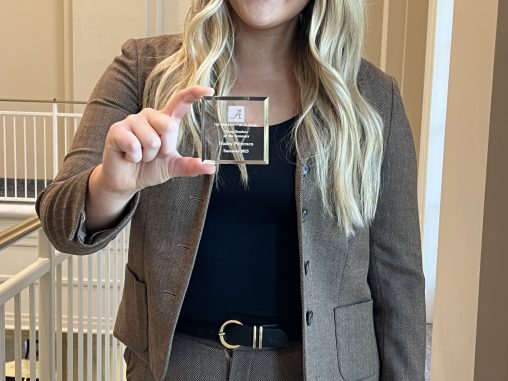
Research
Research activities in the department vary widely, covering most pressing areas in the chemical engineering field today.
News

Meet the Styslinger College of Engineering’s Newest Student Organizations
From bioethics to drone racing, five new student organizations have joined the Styslinger College of Engineering this academic year, giving students new ways to explore emerging fields, gain hands-on experience...

Peitersen Selected as Summer 2025 Outstanding Co-op Student
Hailey Peitersen, a junior majoring in chemical engineering, was selected as the summer 2025 Outstanding Co-op Student by the Engineering Career Development Center. Peitersen recently completed her third term with...

‘GameDay’ Kick Just Part of Student’s Alabama Experience
Oct. 4 wasn’t a typical Saturday for University of Alabama student Gabby Mathis. The chemical engineering major was picked to kick a field goal during ESPN’s “College GameDay” broadcast when...
RESEARCH AREAS
Research efforts are concentrated in biotechnology; computational; polymers and soft materials; electronic materials and devices; and energy and the environment.
- “Green” Chemistry
- 3‐D Printing
- Advanced Materials
- Advanced Polymers and Materials
- Algae Cultivation and Algal Biomass Utilization
- Antibody-Drug Conjugates
- Assembly of Nanomaterials
- Bio/Nanosensors
- Biochemical Engineering for Production of Chemicals
- Biocompatibility and toxicology of nanoparticles
- Bioengineering
- Biomaterials
- Block Copolymers
- Catalysis
- Cell‐Material Interactions
- CO2 Capture Processes
- Computational Screening of CO2 Solvents
- Conjugated Polymers
- Controlled Synthesis
- Drug Delivery
- Drug Discovery
- Drug Resistance
- Electrochemical Engineering
- Electrochemical Engineering for Nanomaterials
- Environmental Catalysis Modeling
- Environmental Remediation
- Fuels
- Functional Material Interfaces for Soft Robotics
- Functionalized Materials for Separation and Catalysis
- Functionalized Membranes for Water Purification
- Green Cosmetics
- High Temperature Coatings
- In‐situ IR Spectroscopy of Thin Film Deposition
- Infrared Spectroscopy
- Interfacial Phenomena
- Intravaginal Rings for (Trans)mucosal Delivery of Drugs
- Ionic Liquids
- Magnetic Hyperthermia
- Manufacturing Cost Modeling
- Materials Characterization
- Mechanical Behavior
- Medical and Health Properties of Berries and Berry Extracts
- Membrane Fouling
- Metabolic Engineering
- Metals
- Microbicides
- Microchannel Devices
- Molecular Sieves
- Mucoadhesive Gels
- Nanodevices
- Nanofibers
- Nanomaterials
- Nanostructures
- Nanotherapeutics
- Natural Products
- Oncology
- Oxidation
- Pharmaceuticals
- Photobioreactor Design
- Polymer Templating
- Polymers
- Process Control
- Process Intensification
- Reaction Engineering
- Sensing
- Simulations of Nanomaterials
- Single-use Bioprocessing Films
- Soil Remediation
- Stretchable Electronics
- Surface Chemistry
- Surface Engineering
- Surface Science
- Surface/Interfacial Engineering
- Synthesis and Characterization of Inorganic Solids
- Synthetic Biology
- Thermodynamics
- Thin-Films
- Tissue Engineering
- Toxicological Evaluation of Novel Materials
- Translational Medicine
- Transport Phenomena in Polymeric Systems
- Tumor Microenvironment
- Vaccines
- Vibrational Spectroscopy
- Water
- Water Treatment
- Wearable Electronics
Laboratories
One of the biggest assets to the department is the 25-foot-tall distillation column, located in the high-bay area of Bevill.
One of only a few of its kind, this $105,000 glass tower was donated by alumnus Ralph Lewis, vice president of sales of Texaco, and the Texaco Corp. Students gain first-hand experience with its controls, design and operation. In the 1,200-square-foot high-bay area, students work with a gas chromatograph, reaction vessels, a computer-controlled batch still interfaced to a Camile data acquisition and control system, and a steady-state glass still. Students spend a good portion of their summer Operations Laboratory performing experiments with the distillation column.

SEMINARS
Spring 2026 Department of Chemical and Biological Engineering Seminar Series
Time: 11:00 AM to 11:50 AM, Thursdays, Central Time
Location: 1026 H.M. Comer
Contact: H. Hohyun Sun; hsun36@ua.edu ChBE office: (205) 348-9140
| Date | Speaker, University/Institute | Title |
|---|---|---|
| 02/05/26 | Dr. Scott Banta, Columbia University | |
| 02/12/26 | Dr. Victor Vasquez, University of Nevada-Reno | |
| 02/19/26 | Dr. Kyeongjae Cho, University of Texas at Dallas | |
| 03/05/26 | Dr. Gao Liu, Lawrence Berkely National Laboratory | |
| 03/12/26 | Dr. Enoch Nagelli, United States Military Academy at West Point | |
| 03/26/26 | Dr. Feng Lin, Brown University | |
| 04/09/26 | Dr. Jeffrey Greeley, University of Wisconsin | |
| 04/16/26 | Dr. Jie Xiao, University of Washington |